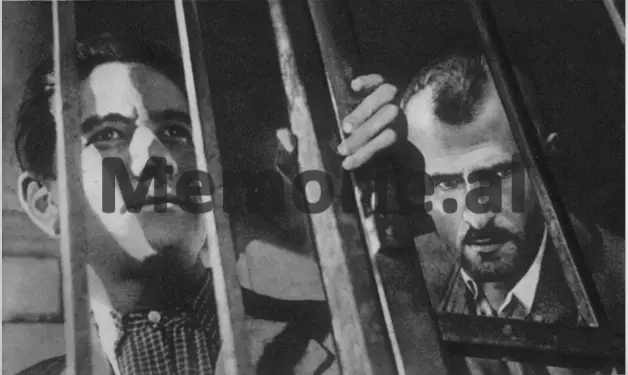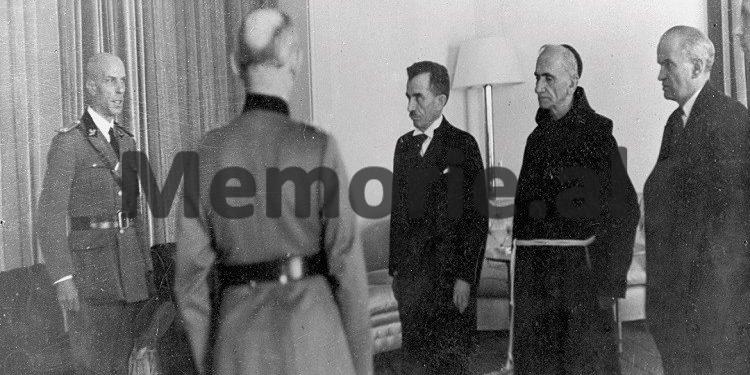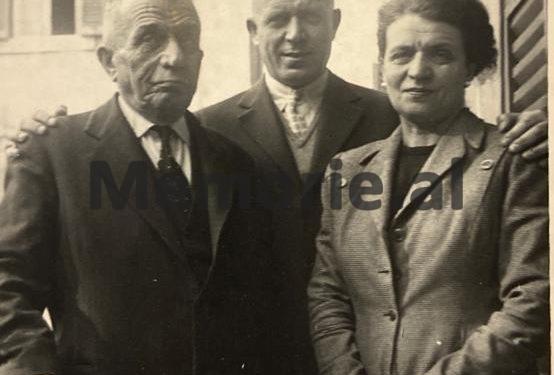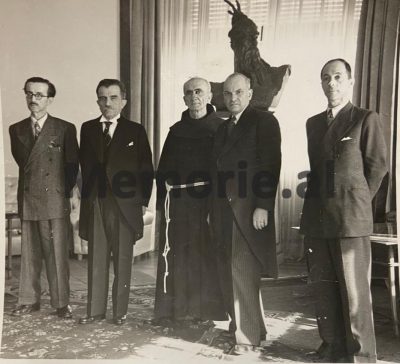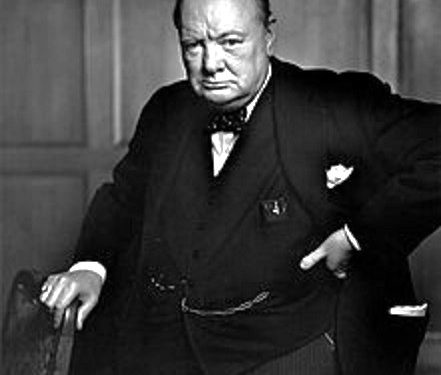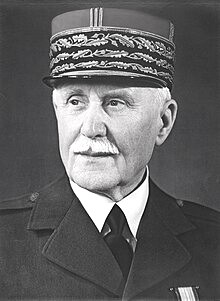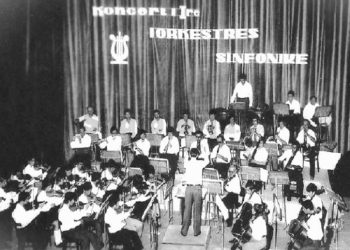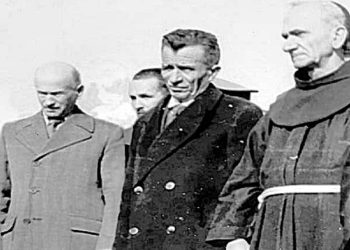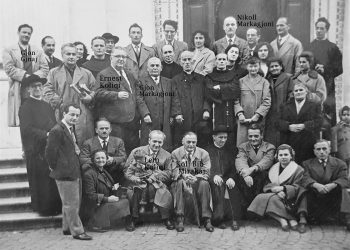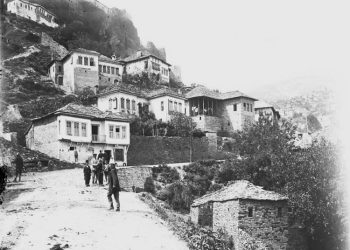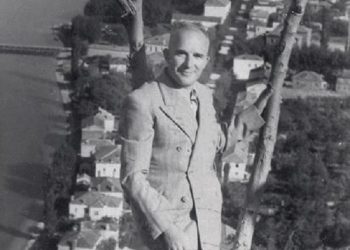By Islam Spahiu
Part One
– TWO SIDES OF A MEDAL –
Memorie.al / On August 22, 2016, a daily newspaper published a controversy between Mr. Shaqir Vukaj and Mr. Hamza Kazazi, on the occasion of the 73rd anniversary of the Reç War. On this occasion, the former defends the thesis of the Albanian communists, while the latter, it’s opposite. Such a debate would be very useful for Albanian historiography, when we consider that the clash of opinions leads to correct conclusions, but when you see that each side sees only one side of the issue, then here we are dealing with that phenomenon, which in the popular expression is called; “one hits the nail, the other hits the horseshoe”. To avoid this disagreement, I am of the opinion that all those who have been eyewitnesses to historical events, and who have arguments and facts that dot the “i”, should participate in this debate.
“No witness is better than your own eyes” – says a proverb and, under this prism, I will try to make my modest contribution to the clarification of the truth. I would not like to dwell on the War of Reç; I will leave that to the aforementioned gentlemen of the occasional polemic, but before we enter the topic I have chosen, I cannot help but make a remark, as a simple reader, on the harsh, accusatory stance of Mr. Vukaj and that of Mr. Hamza Kazazi, almost humble and acquittal, as if he were a defendant before the court.
I say this because; while Mr. Vukaj accuses Kazazi’s father (Jup Kazazi) as a “collaborator”, the latter writes verbatim: “Jup told his wife and relatives that the only mistake in his life was that he accepted a position during the fascism period and that, as soon as the situation calmed down, at the end of the war, he would ask to go to court himself, precisely because the communists were talking”.
– With this statement, Mr. Vukaj emerges as the winner of a battle, but I would say, not of the entire war; this is why we will continue to see both sides of the coin and by going to the end of the matter, without being afraid of the truth, because, as Shakespeare said; “The truth must be often spoken, because lies are often repeated”. – Let’s take the most important issues:
- The Anti-Fascist National Liberation War: Liberation War or Civil War?
First of all, we must remind Mr. Vukaj, that he forgets, from the beginning, what basis the so-called “National Liberation War” had? I believe that he knows well that the Albanian communists did not oppose the Italian invasion of April 7, 1939. At that time, the German-Soviet pact was in force. Occupied Poland was divided in half between them; in the square of Warsaw, a joint parade of the two armies took place.
The COMINTERN, from Moscow, issued a call to all communists of the world: Do not oppose the just war of fascism, against world capitalism. I was 10 years old at that time and I read fascist songs with my own eyes, without any changes, from partisan songs. And so, at this time there were no partisans in Albania.
Only the nationalists made the gesture of resistance (there was no other possibility), but it should be known that from small gestures, great battles are made. Therefore, it should also be known that Mujo Ulqinaku was not a communist, as you wanted to make him out to be; that former non-commissioned officer with the initials “Z” (Zogu I) on his hat.
And while the nationalists were being interned in Ventotene, the Albanian communists were enthusiastically rubbing their hands over the “successes” of Hitler’s “Blitzkrieg”, and only when Hitler’s Germany attacked the Soviet Union, their ideological homeland, did they take up arms – oh my! For a foreign country, not for their own! – And how is it possible that Mr. Vukaj, who is considered a connoisseur of history, ignores this undeniable fact?
His Excellency does not mention the AKP at all and who organized it! Wasn’t it the Montenegrin Miladin Popovic who organized and led the Albanian Communist Party until the end of the war? Where did the LANÇ take its leadership? This name was taken from AVNOJ, translated from Serbian. Then the question arises: Against whom was the rifle of the Albanian partisan directed, against the foreigner, or against his own brother?
A scientific statistic would bring to light a terrible balance, the “National Liberation Army”, under the leadership of the AKP, which in turn was led by the Yugoslav one, fought under the slogan; “against internal enemies” or “reactionaries” and then washed its mouth “against the occupier”! The human losses during the Second World War in Albania, in the largest percentage, are Albanians who were killed by their brothers; the examples are known from the families of the victims, who commemorate their own to this day.
If the Anti-Fascist National Liberation War was truly liberating, what did Mehmet Shehu’s 1st Brigade want, in a village of Peqin, where 67 innocent villagers were massacred? Were they “occupiers”?! The communists were proud of this crime: “they killed so many ballistas…”, but what did the 5th “Assault” Brigade of Shefqet Peçi want in the distant Luma, rushing from the South to the North? Why did they kill the two 20-year-old teachers who had just completed the ‘Normal’ of Elbasan?
Wasn’t their village, Lusna, right then, to stand up, with the greatest and the least, and fall to that bloody brigade? We’re not the innocent villagers of Buzmadhe, where 21 people were shot, among whom was a 19-year-old Albanian? This happened on September 26, 1944. In the same year, 4 men were shot in the village of Novosej. Are these peaks of horror not enough to prove that that war was not at all “liberation”, but truly fratricide? Let’s look at other issues below.
- COLLABORATIONISM IN ALBANIA 1939-1944
Considering what we said above, let us carefully analyze this term, which constitutes the accusation of the Albanian communists against the nationalists during the occupation, an accusation that they use as a battle horse to this day! According to the dictionaries of various European languages, the term “collaboration” is explained, among others, by the word compromise. Historical compromises are known. Let us examine it a little, without rushing, to get to the bottom of the matter.
There are no people in the history of humanity, not even the greatest ones, that has ensured its existence, – in one way or another – without the support or cooperation of someone else. If this is the case, why would a small people like ours be an exception, especially when it is known that historically, it has been the object of contempt and violence for the Great Powers? It was the Treaty of London that turned Albania into a battlefield between the warring powers during World War I.
A spokesman for the English government, when asked who his country’s permanent friends were, replied: Great Britain has no permanent friends, but permanent interests. Meanwhile, on the eve of the invasion of Albania by fascist Italy, the English conservative prime minister, Chamberlain, when asked what position his government would take towards any eventual attack by Italy on Albania, replied with his mouth full: Great Britain has no interests in Albania.
– That would not be enough, if we did not know another significant fact, which proves even more, how important Albania was in the international arena. Everyone knows that during World War II, all the Kings of the occupied countries emigrated and, most of them sought refuge in England, to the “Mother of the World’s Kingdoms”, as one might say in this case.
This is what happened to our King, Zog I, and King of the Albanians; but here an exception was made: The traditional British Kingdom did not deign to recognize this “self-proclaimed” King, as his enemies called him. They also refused his request to meet with any head of the Kingdom and left him as a simple immigrant, in a private hotel. And, of course, the Albanian King, disappointed, left there and, after some mishaps, passed away in a private clinic, in the suburbs of Paris.
But the opposite happened to King Constantine of Greece. He was placed in a special villa, in the middle of London, guarded by the Royal Guard. Even if what was said above is little, isn’t it clear that; The Great Powers have historically denigrated Albania? It is worth remembering the case when the London Conference established the borders of 1913, which left out purely Albanian countries and lands. Then our great Fishta blurted out: “Ugh! Europe you whore of the weather / Qi i rae mohit tsës God! / But is this â saint of citizenship / to give me the lands of Albania / to keep the Russian yoke”?!
Then, what stance would our patriots take in the face of such hostility, which aimed at the annihilation of the nation and the Fatherland? Let us give the right answer as realists and not as dreamers. The most accurate answer, we think, is the sacrifice they made under the motto; “Homeland above all”. Not in vain, here we will remember the expression of the great Hungarian poet, Petöf: “For love I give my life, but for freedom I give love”. – And, without a doubt, we would say that our patriots accepted an even greater sacrifice; even sublime: with their gesture they said: “For honor we give our lives, but for the Homeland, we also give honor”, and they did; they accepted the cursed nickname “collaborator” and were not afraid of death, for this.
Examining this phenomenon without prejudice, we will come to the right conclusion that this term, in this place and time, loses the shadow of evil and takes on the brilliance of good; it turns into the opposite: they receive the grace of heroism; they melted everything for the most sacred ideal: the Homeland. “The end justifies the means” is one of the principles of the Jesuit order. Thus, the curse is definitely turned into respect. Such a phenomenon is known in different countries and eras, and by specific people. For example:
COUNTESS WALEWSKA
Unfortunate Poland had suffered a painful partition between Prussia, Russia and Austria in 1795. The population there would have welcomed Napoleon Bonaparte as a savior. He, too, had an interest in creating an allied state in the center of Europe. When the French emperor entered Warsaw with his army (1807), the Polish aristocracy gave him a magnificent reception; among them was Countess Walewska.
She had a conversation with the emperor; for Napoleon, he was a “flirt”. The iron lady did not want to surrender; she did not want to betray her old husband. But – it seems strange – not only the country’s leadership, but her husband himself, did their best to convince the Polish high lady to give herself to the French emperor; and this in the name of saving the homeland. After some hesitation, she finally agreed. She gave personal honor, for what was most precious to the nation.
Now a curiosity: according to serious biographers from the homeland, of the few women who were associated with Bonaparte, the only one who remained loyal to him until the end was Countess Maria Walewska. Emil Ludwig, in his major work “Napoleon”, among other things, wrote about several anecdotes from Bonaparte’s life. After the first abdication, as is known, the Great Powers recognized his sovereignty over the island of Elba (1814-1815).
Describing the sovereign’s residence, he draws attention: “…in the garden of Bonaparte’s villa, a child of 10 years old was seen playing, dressed in Polish costume.” This was the natural son of Napoleon I and Countess Maria Walewska. He received the title of “Count Colonna”, which later became a political figure. Under the rule of Napoleon III, he was Minister of Foreign Affairs (1855), and then managed to chair the Congress of Paris (1856).
WINSTON CHURCHILL
Let’s come here to the time of World War II (1939-1945). Europe was shocked by Hitler’s declaration of “Blitzkrieg”. The main objective was England. After an escalation of the war, London was bombed and badly damaged; horror had already seized the people. In 1942, the government of the conservative Prime Minister, Churchill, made an alliance with Stalin’s Soviet Union. In political circles, perhaps even among the people, this act was called a scandal.
In the British Parliament, the House of Lords, the latter rose up alarmed and indignant and protested. To the question; how is it possible that a country like England, a Kingdom traditionally known as a symbol of authority and civilization, could fall into an alliance with the most barbaric and obscurantist country with a totalitarian communist regime?! Churchill, with the proverbial English coolness, replied: “If Hitler invades hell, we will fight side by side with the devil”. – This expression, we believe, needs no comment.
MARSHAL PETAIN
– Since the term “collaborationism” was born during the Second World War, precisely as a definition of the phenomenon of collaboration with the Nazi German occupier, let us take a look at France of this time, which is typical in this regard. At this time and in this country, we have two sides of the same coin: the first is the unyielding resistance of the French people against the occupier under the leadership of General De Gaulle, and the other is that of the collaborators (collaborators) with the occupier, with the aim of saving the homeland; led by Marshal Petain.
We have no comment on the first, because it is understandable by anyone, while the second side of the coin appears enigmatic and requires a lot of patience and courage to unravel to the end. Then let us deal with the second. The main protagonist of this story in France, without a doubt, was Marshal Petain. After a glorious career in the service of his country, he sacrificed his fame and honor when France was facing an annihilating danger. Here is how:
He was ambassador in Madrid when Germany attacked France (1939). He was called to the government and appointed chairman of the Council of Ministers. Immediately after that, he asked for an armistice with Germany. Endowed with full powers by the National Assembly, on July 10, 1940, at the age of 84, he was recognized as head of state in Vichy. For domestic policy, he declared the “National Revolution”, while for foreign policy he chose the path of “collaborationism”. Already in his post, in this free zone, in November 1942, he was increasingly dependent on the Germans, who took him with them, during the retreat in August 1944.
Transferred to Singmaringen with his government, he returned to France, where after a year (1945) he was sentenced to death by the Supreme Court, but for the sake of the high services and the glory he gave to the homeland in the past, his sentence was commuted to life imprisonment, which he served on the island of Yen, on the coast of the Atlantic Ocean – the fortress still stands today – Let us not forget that the building where his trial took place was surrounded by a company of soldiers, guarded by the revolted crowds of the people, who cheered for the hero Petain and demanded his release.
However, he achieved his goal: If a war had been waged between France and Germany, in addition to the unforeseeable human losses, France would have been destroyed. It is known how Hitler’s army left abandoned places. Just one example is enough: Warsaw was turned into ruins, while in colossal Paris, by direct order of Hitler, not a single tile was touched. Memorie.al




